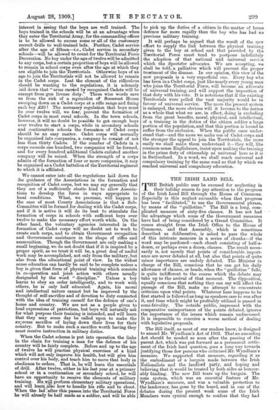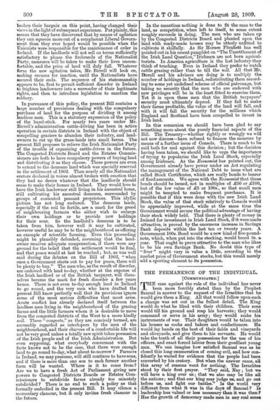THE IRISH LAND BILL.
MBritish public may be excused for neglecting in eir holiday season to pay attention to the progress of the Irish Land Bill through the House of Commons. Especially is this neglect excusable when that progress has been "facilitated," to use the Governmental phrase, by means of the "guillotine." The Bill is a long, com- plicated measure of sixty-five clauses. It has not had the advantage which some of the Government measures have had of being considered by a Grand Committee. It comes straight from the Irish Office to the House of Commons, and that Assembly, which is sometimes described as deliberative, is asked to pass the whole of this intricate measure in a, series of chunks—if the word may be pardoned—each chunk consisting of half-a- dozen, or perhaps even a dozen, clauses. The result neces- sarily is, not merely that points of considerable import- ance are never debated. at all, but also that points of quite minor importance are unduly debated. The Minister in charge of the Bill, conscious that he can get his daily allowance of clauses, or heads, when the " guillotine " falls, is quite indifferent to the course which the debate may take up to the arrival of that moment. The Opposition, equally conscious that nothing they can say will affect the passage of the Bill, make no attempt to concentrate criticism upon vital points. Whatever hare happens to be first started is followed as long as speakers care to run after it, and time which might be profitably utilised is passed in semi-frivolity. The outside public, impressed with the comparative unimportance of the points debated, ignores the importance of the issues which remain undiscussed. It is impossible to conceive a worse method of dealing with legislative proposals.
The Bill itself, as most of our readers know, is designed to amend Mr. Wynd.ha.m's Act of 1903. That an amending Act should. be needed so soon after the passing of the parent Act, which was put forward as a permanent settle- ment of the Irish land question, goes a long way towards justifying those few persons who criticised Mr. Wyndham measure. We supported that measure, regarding it as the embodiment of a bargain made between the Irish Nationalists and the landlord party, and hoping and believing that it would be treated by both sides as honour- ably binding. The new Bill tears up the bargain. The zone system, which was an essential feature of Mr. Wyndham's measure, and was a valuable protection to the landowner, has gone by the board, and in one of the debates during the present week some of the Irish Members were cynical enough to confess that they had broken their bargain on this point, having changed their views in the light of subsequent experience. Put plainly, this means that they have discovered that by means of agitation they can squeeze more out of a complacent Liberal Govern- ment than they ever hoped would be possible when the 'Unionists were responsible for the maintenance of order in Ireland.. If the landlords will not sell on terms sufficiently satisfactory to please the firebrands of the Nationalist Party, measures will be taken to make their lives uncom- fortable, and the price of land will duly fall. Whatever form the new agitation takes, Mr. Birre11 will look on, mating excuses for inaction, until the Nationalists have secured their ends. The sequence of his statesmanship appears to be, first to permit sufficient disorder in Ireland to frighten landowners into a surrender of their legitimate rights, and then to introduce legislation to sanction the robbery.
In pursuance of this policy, the present Bill contains a large number of provisions dealing with the compulsory purchase of land for the purpose of dividing it among landless men. This is a statutory expression of the policy of the hazel-stick. For nearly two years under Mr. Birrell's administration cattle-driving has been in active operation in certain districts in Ireland with the object of compelling graziers to abandon their industry, and land- owners to cut up the grass-lands into small farms. The present Bill proposes to relieve the Irish Nationalist Party of the trouble of organising cattle-drives in the future. The Congested Districts Board and the Estates Commis- sioners are both to have compulsory powers of buying land and distributing it as they choose. These powers are even to extend to the demesne land which was specially reserved in the settlement of 1903. Then nearly all the Nationalist orators declared in voices almost broken with emotion that they had no desire whatever that the landlords should cease to make their homes in Ireland. They would love to have the Irish landowner still living in his ancestral home, still cultivating his ancestral demesne, surrounded by groups of contented peasant proprietors. This idyllic picture has not long endured. The demesne lands, especially if the soil be fertile, are a mark for the greed of neighbouring farmers who either wish to enlarge their own holdings or to provide new holdings for their sons. So the landlord's demesne is to be taken from him, however well it may be cultivated, however useful he may be to the neighbourhood as offering an example of scientific farming. Even this proceeding might be plausibly defended, assuming that the land- owner receives adequate compensation, if there were any ground for the belief that the settlement would be final, and that peace would at last be reached ; but, as was well said during the debates on the Bill of 1903, "when once a Government starts out to pay for peace, there will be plenty to buy." The men who, as the result of disorder, are endowed with land to-day, whether at the expense of the Irish landlord or of the British taxpayer, will them- selves become the mark for fresh disorder a few years hence. There is not even to-day enough land in Ireland to go round, and the very men who have drafted the present Bill know perfectly well that its provisions ignore some of the most serious difficulties that must arise. Acute conflict has already declared itself between the landless men living in the neighbourhood of the grazing farms and the little farmers whom it is desirable to move from the congested districts of the West to a more kindly soil. These "congests," as they are concisely termed, are excusably regarded as interlopers by the men of the neighbourhood, and their chances of a comfortable life will not be very good unless a totally new spirit takes possession of the Irish people and of the Irish Administration. But even supposing, what everybody conversant with the facts knows not to be the case, that there were enough land to go round to-day, what about to-morrow ? Farmers in Ireland, we may presume, will dill continue to have sons, and if there is more than one son to each farmer another farm will be wanted. Where is it to come from? Are we to have a fresh Act of Parliament giving new powers to Congested Districts Boards or Estates Com- missioners to subdivide farms already, too minutely subdivided ? There is no end to such a policy as that formally embodied in the present Bill. It may silence a momentary clamour, but it only invites fresh clamour in the future. In the meantime nothing is done to fit the man to the land, as competition, when left to itself, to some extent roughly succeeds in doing. The men who are taken up by the Congested Districts Board and planted upon the land with ready-made houses may be utterly unfitted to cultivate it skilfully. As Sir Horace Plunkett has well pointed out in his recent pamphlet on "The Unsettlement of the Irish Land Question," Irishmen are not born agricul- turists. In America agriculture is the last industry they think of touching. Even in Ireland they prefer to watch cattle grazing rather than to till the soil. All that Mr. Dirrell and his advisers are doing is to multiply the number of holdings in Ireland, redistributing them accord- ing to some yet undefined scheme of official patronage, but taking no security that the men who are endowed with new privileges will be in the least fitted to exercise them. Yet it is upon these men that the British taxpayers' security must ultimately depend. If they fail to make their farms profitable, the value of the land will fall, and with it will fall the security for the millions which England and Scotland have been compelled to invest in Irish land.
In this connexion we should have been glad to say something more about the purely financial aspects of the Bill. The Treasury—whether rightly or wrongly we will not now discuss—have refused to finance the measure by means of a further issue of Consols. There is much to be said both for and against this decision; but the decision having been taken, we should like to urge the importance of trying to popularise the Irish Land Stock, especially among Irishmen. As the Economist has pointed out, the Government already have power under an Act regulating the management of the National• Debt to issue what are called Stock Certificates, which are really bonds to bearer of fixed amounts. We agree with the Economist that these bonds should be issued, not in multiples of .,t50 or £100, but of the low value of .25 or 100s., so that small men might be tempted to make frequent purchases. It is possible that if this were done with the new Irish Land Stock, the value of that stock relatively to Consols would be appreciably improved, while at the same time the Government would secure the political advantage of having their stock widely held. That there is plenty of money in Ireland for investment in Irish Land Stock, if it were made attractive, is proved by the enormous increase in Savings Bank deposits within the last ten or twenty years. A Government 100s. Bond would be a new kind of five-pound- note, which, when put into the stocking, would breed 3s. a year. That ought to prove attractive to the man who likes to be his own Savings Bank. No doubt this type of " fiver " might vary in value a, little, according to the market price of Government stocks, but this would merely add a sporting element to its possession.







































 Previous page
Previous page